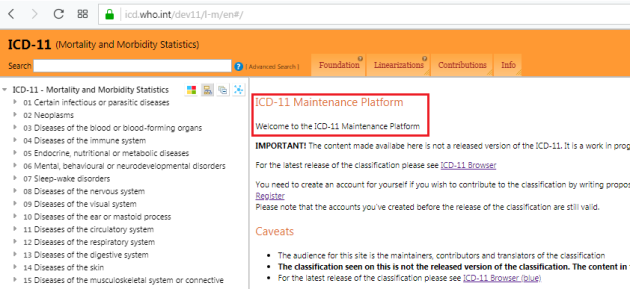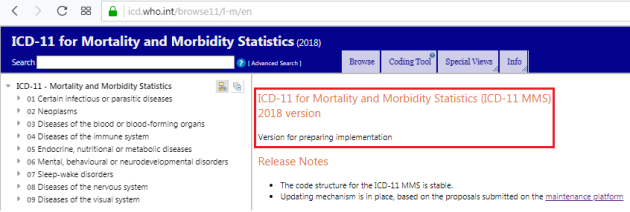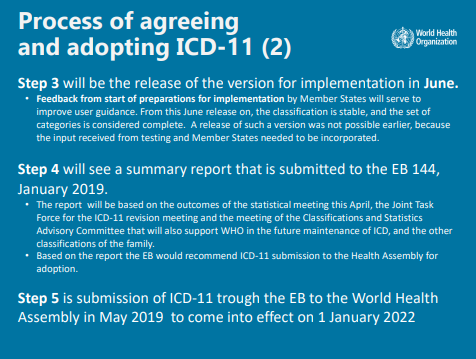World Health Organization finally releases next edition of the International Classification of Diseases (ICD-11)
July 25, 2018
Post #339 Shortlink: https://wp.me/pKrrB-4nC
(Key links from this post are also available on the ICD-11 2018 tab page.)
After 11 years in development and four extensions to the timeline, the World Health Organization (WHO) finally released a version of ICD-11 on June 18th.
Advanced preview
The WHO is presenting this June release as an “advance preview” to enable countries to start planning for implementation, prepare national translations and begin training health professionals.
ICD-11 MMS is scheduled for presentation at the World Health Assembly (WHA) in May 2019 for adoption by member states, but WHA endorsement won’t come into effect until January 1, 2022. After that date, member states can begin using the new edition for data reporting — if they are ready.
The WHO has bought itself a further three and half years in which to complete the preparation of implementation and support materials and finalize companion publications and other derivatives.
Dr Christopher Chute, chair of ICD-11’s Medical and Scientific Advisory Committee (MSAC), predicts that early implementers may require around five years to prepare their countries’ health systems for transition. Member states using a “clinical modification” of ICD are likely to take longer to develop, test and roll out a country specific adaptation.
There is no mandatory implementation date — member states will migrate to ICD-11 at their own pace and according to their countries’ specific timelines, requirements and resources.
Global adoption will likely be a patchy and prolonged process and for a period of time, WHO will be accepting data recorded using both ICD-10 and the new ICD-11 code sets.
No countries have announced implementation schedules. NHS Digital says:
“…No decision has been made for the implementation of ICD-11 in England, however NHS Digital plan to undertake further testing of the latest release and supporting products that will inform a future decision.”
In the meantime, the mandatory classification and terminology systems for use in the NHS are ICD-10* and SNOMED CT UK Edition**.
*NHS currently mandating ICD-10 Version: 2015.
**Read Codes (CTV-2 and CTV-3) are retired. SNOMED CT became the mandatory terminology system for use in NHS primary care in April 2018. Secondary Care, Acute Care, Mental Health, Community systems, Dentistry and other systems used in the direct management of care of an individual are scheduled to adopt SNOMED CT as the mandatory clinical terminology before 1 April 2020.
Key links
ICD-11 launch News Release
Launch information and short videos: ICD-11: Classifying disease to map the way we live and die
A dedicated website for ICD-11 information has been launched: https://icd.who.int
ICD-11 Beta Draft becomes ICD-11 Maintenance Platform
The orange ICD-11 Beta drafting platform is renamed to the “ICD-11 Maintenance Platform” and will remain in the public domain as a “work in progress” between stable releases.
The content on the orange platform will change as the substantial backlog of earlier proposals and new proposals submitted since the June 2018 release are processed.
An approved proposal for an addition or other change won’t immediately be reflected in the released version of the ICD-11 MMS but carried forward for eventual incorporation into a later release, according to the update cycle for that particular class of change.
There is a current backlog of over 1000 proposals waiting to be processed. New comments and proposals will continue to be accepted (see Annex 3.7 of the Reference Guide for maintenance and update schedules and guidance on submitting new proposals).
(If you were registered with the Beta drafting platform for access to the Comments function and Proposals Mechanism your account will work for the Maintenance Platform and you will be able to access historical comments and proposals.)
The maintenance and update of ICD-11 will be advised by the Classifications and Statistics Advisory Committee (CSAC); the Medical and Scientific Advisory Committee (MSAC); the Mortality Reference Group; the Morbidity Reference Group; and the Functioning and Disability Reference Group.
It is currently unclear in which year the first update cycle is anticipated to start, i.e., whether the next stable version would be released in January 2020, or in a later year.
The ICD Revision Topic Advisory Groups and sub working groups ceased operations in October 2016 and the Joint Task Force is expected to be stood down later this year.
The ICD-11 Maintenance Platform displays both the Foundation Component and the combined Mortality and Morbidity Statistics linearization:
https://icd.who.int/dev11/f/en#/

The ICD-11 for Mortality and Morbidity Statistics (ICD-11 MMS) 2018 version is on a new blue platform:
https://icd.who.int/browse11/l-m/en

This platform currently displays only the MMS Linearization codes, not the Foundation Component which contains all the ICD entities. As released in June 2018, the content is planned to remain stable until January 2019, in preparation for presentation at the May 2019 World Health Assembly.
There is a coding tool here:
ICD-11 Coding Tool Mortality and Morbidity Statistics (MMS) 2018:
https://icd.who.int/ct11_2018/icd11_mms/en/release#/
The ICD-11 Reference Guide (the equivalent of ICD-10’s Volume 2) is here:
https://icd.who.int/browse11/content/refguide.ICD11_en/html/index.html
(At the time of publication, there is no PDF version of the Reference Guide only an html version.)
What hasn’t been released yet?
Not all disorder “Descriptions” texts and other “Content Model” parameters have been populated and the full ICD-11 implementation package isn’t completed.
An updated ICD Revision information page states: “A suite of tools and functionality facilitate implementation and use of ICD-11.” But not all the tools and other materials listed under the Implementation Support tab are currently available.
The list also mentions “Specialty versions” but none of these are available; for example, the ICD-11 Clinical descriptions and diagnostic guidelines for Mental and Behavioural Disorders (the equivalent to ICD-10’s “Blue Book”) hasn’t been released yet.
This companion publication provides expanded clinical descriptions, differential diagnoses, diagnostic guidelines and codes for the categories in Chapter 06: Mental, behavioural and neurodevelopmental disorders including: “Essential (Required) Features, Boundaries with Other Disorders and Normality, and Additional Features sections. Additional sections (e.g., Culture-Related Features).”
Practitioners who have signed up to the Global Clinical Practice Network have had the opportunity to review and comment on drafts of the full clinical description and diagnostic guideline texts but drafts have not been available for public stakeholder review.
It’s not known whether this specialty mental disorder publication is planned to be released later this year or if the content cannot be finalized until after the ICD-11 MMS code sets have been ratified, in May 2019.
ICD-11 PHC: the revision of the 1996 publication: Diagnostic and Management Guidelines for Mental Disorders in Primary Care: ICD-10 Chapter V Primary Care Version (aka “ICD-10 PHC”) has not been released, either.
Drafts of the full texts for the disorder descriptions, as currently proposed for the 27 mental disorders for inclusion in ICD-11 PHC, are not available for public stakeholder scrutiny. There is no publicly available timeline for the finalization and release of ICD-11 PHC nor is it clear whether any additional field trials are in progress or have been recommended. NB: This publication will not be mandatory for use by WHO member states and it does not override the ICD-10 and ICD-11 code sets.
Additional materials
Brief Report from the Director-General: World Health Organization, EXECUTIVE BOARD EB143/13, 143rd session April 9, 2018, Provisional agenda item 5.2: International Statistical Classification of Diseases and Related Health Problems: update on the eleventh revision: http://apps.who.int/gb/ebwha/pdf_files/EB143/B143_13-en.pdf
Presentation Slides: ICD 11th revision, Member State Information Session Geneva, May 14, 2018, Dr John Grove, Director, Department of Information, Evidence, and Research, WHO and Dr Robert Jakob, Team Lead, Classifications, Terminologies and Standards, WHO https://dxrevisionwatch.files.wordpress.com/2018/05/icd11.pdf

Audio file from WHO Press Conference: June 14, 2018, Release of ICD-11 – the 11th revision of the International Classification of Disease, Dr Shekhar Saxena, Director, Department for Mental Health and Substance Abuse, WHO, Dr Robert Jakob, Team Lead, Classifications, Terminologies and Standards, WHO
Mp3 audio file [39:25 min]:
Presentation by Dr Michael First: Differences Between ICD-11 Classification of Mental & Behavioural Disorders and DSM-5. Nasjonal kompetansetjeneste ROP, Published July 20, 2018 [32:38 mins]
https://rop.no/roptv/hva-er-forskjellene-mellom-psykiske-lidelser-i-icd-11-og-dsm-5/
